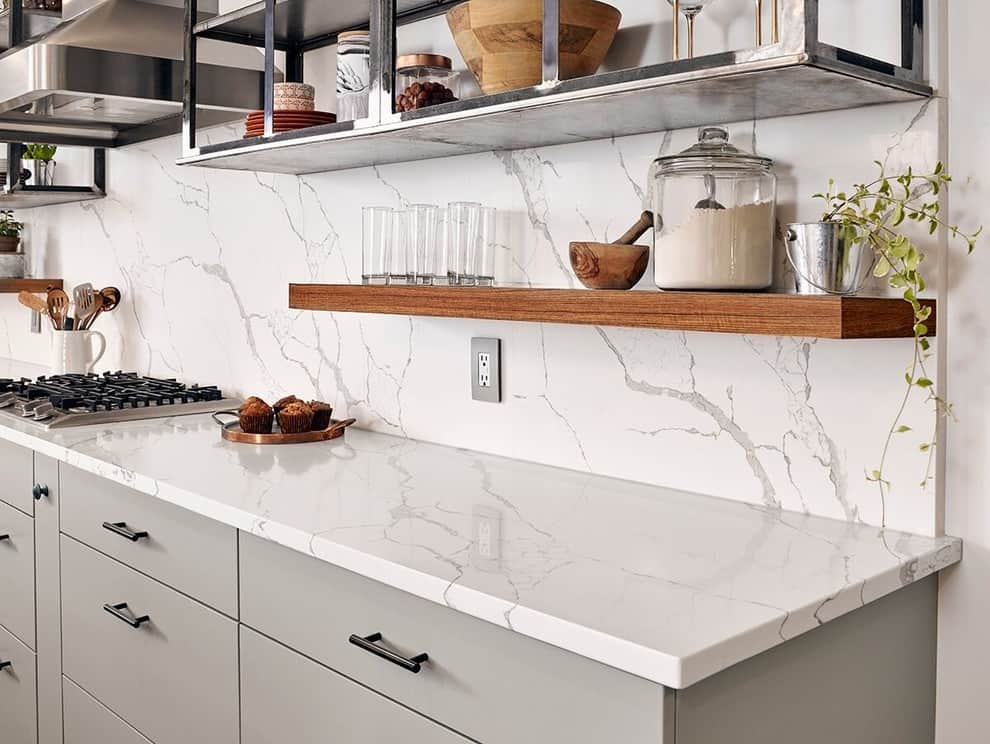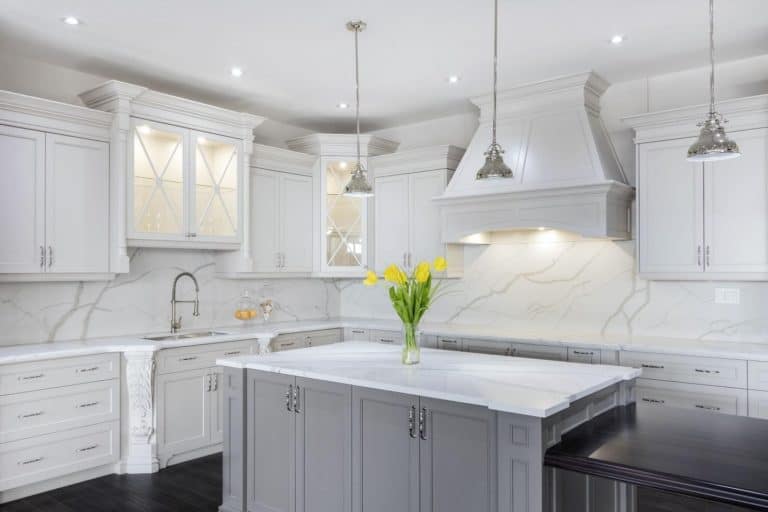Pros And Cons Of Marble In Bathroom
You've heard of quartz countertops, but have you heard of a quartz backsplash? While quartz in a kitchen is usually found as part of a countertop design, more and more designers are choosing to install a quartz backsplash in their kitchens.
Backsplash tile is so played out these days!
Quartz slab has many advantages over the tile and natural stone (granite, marble etc) that is usually found in kitchen countertop and backsplash ideas. So how does this engineered stone material work as a backsplash… and is it worth buying? You can find different quartz backsplash options to buy now, and continue reading through the article to find out the pros and cons. of getting a quartz backsplash.
Here we look at the pros and cons of quartz backsplashes, helping you to explore different backsplash ideas for your kitchen!
Please note that we may earn a small affiliate commission from qualifying purchases in this article.
Quartz Backsplash Pros and Cons
Pros
- Consistent patterns & designs
- Available in many color options
- Works for both modern & traditional kitchen designs
- Starts at $65 per square foot
- Easy to repair & maintain
- Easy to clean
- Mold & mildew resistant
- Water & stain resistant
- Can be made seamless (no grout lines)
- Can be integrated into a feature wall
- Almost 100% non-porous
There are many reasons that you might want to try quartz for a kitchen or bathroom backsplash. Quartz slabs can be engineered to come in basically any color/pattern/style you want, so it's easy to adapt them to your existing bathroom or kitchen space.
Cons
- High-quality & custom quartz can be expensive
- Quartz isn't unique like natural stone
- Cheaper quartz backsplashes may have seams
- Not super heat resistant (up to 200°F)
- Fades in direct UV sunlight
There aren't too many disadvantages to quartz backsplashes, but remember that if you're going to start requesting custom quartz designs instead of using stock styles, then you're going to start racking up the dollars. If you want a quartz backsplash to look nice, you often need to spend a little extra.

What are Quartz Backsplashes Made From?
Quartz is not a natural stone like granite or marble. Granite and marble are naturally found in quarries around the world and then extracted and cut into marble countertops or granite backsplashes. The more rare and precious the granite selection is, the higher the price will usually be.
This is not the case with quartz.
Quartz is an engineered stone, meaning that it has been made artificially by a kitchen countertop company that fabricates stone. The material is around 93% quartz minerals (natural stone aggregate) and around 7% resins, polymers, pigments and fillers.
By adjusting the ingredients, the company can make different colors, patterns, and styles.
Most stone fabricators will produce quartz slabs in stock prefabricated designs, though many will also allow you to request custom designs if you've got a specific aesthetic in mind for your quartz backsplash. You can also get quartz slabs created to match your kitchen space, meaning no seams or lines.
Of course, if you're getting a custom quartz backsplash, it's not going to be cheap, so keep that in mind!
Common types of Quartz
If you're looking to save money, you should consider a common prefabricated design. These styles are commonly available from multiple companies, whether you use them from countertops, backsplashes, or anything else!
- Calacatta Classique Quartz – white quartz with large, bold gray veins
- Mystic Gray – solid mid-tone gray quartz with dark flecks
- Blanca Arabescato – pale gray quartz with distinctive brownish veining
- Calacatta Laza – white quartz stone with dramatic gray veining
- Calacatta Verona – classic white marble look
These stock materials can serve as inspiration for your quartz backsplash, countertop, breakfast nook, and many other aspects of your kitchen remodel. If you can't afford to request custom quartz countertops, be sure to check out these great designs.
Is Quartz good for backsplash?
Quartz is very good as a backsplash material thanks to its price, durability and versatility in terms of design. Here are some of the many reasons that you should consider quartz for your kitchen or bathroom backsplash,
It complements any kitchen design
Quartz countertops come in a wide range of colors, styles, and patterns. Because it's an engineered stone, it's easy for a designer to request quartz in a style that exactly complements the appliances, countertop, cabinetry and existing design elements of the kitchen.
If you've got ideas for quartz backsplashes, the sky's the limit.
By adjusting the pigments and minerals used to create a quartz countertop or backsplash, you can make quartz countertops that match a white kitchen, a dark kitchen, traditional designs, modern kitchen designs, and everything in between. Match your backsplash to your cabinets if you want to!
You can get a seamless finish
Because quartz material is engineered rather than found in a quarry, it can often be made to your exact specifications. This means that your quartz countertop or backsplash could be made as one singular piece, so there's no need for seams where two slabs join together!
Seams like a good plan! (sorry).
When working with granite countertops and other natural stone materials, you often end up with seams where two pieces of granite slab have joined together, ruining the design. Quartz does not have this issue – it can blend seamlessly into the walls and countertops if you choose.
The backsplash design can serve as a focal point
If you're going for a feature wall, you can easily integrate your quartz backsplash into your feature wall and make it part of the focal point in your kitchen design. If you get quartz backsplash material that is nice enough, you could even make the backsplash itself a focal point!
How you use your quartz backsplash within the space depends entirely on your countertop type, cabinets, sink style, and various other aspects of your design. Different kitchens call for different points of focus!
It's easy to clean
A quartz countertop is very easy to keep clean, and the same goes for quartz backsplashes too. All you need to clean a quartz backsplash is some regular everyday water and mild detergent or disinfectant – you don't need any fancy cleaning products.
On the other hand, materials like granite need specialized cleaning and regular "sealing" in order to keep them in good condition. This can be very expensive and time-consuming, which isn't ideal for a busy kitchen.
It's almost 100% non-porous
Natural stone materials like marble and granite naturally have pores and small holes where bacteria, mold, water, and food stains can get inside and stay, making it difficult to fully sanitize their surfaces.
However, quartz is almost 100% non-porous because it's designed that way by the fabricators. The reason is to make it more difficult for bacteria and stains to penetrate the surface, extending its lifespan and making it more hygienic.

Should your backsplash match your countertop?
Your backsplash does not have to match your countertop, though many people do like that design choice. Still, if your countertop and backsplash do not match, they should be designed in such a way that they complement one another.
A pale quartz backsplash often pairs well with dark countertops for a high-contrast modern look, though it can also be used in darker colors to complement the dark woods and farmhouse sink of a country-style kitchen.
How do you match a quartz countertop to a backsplash?
If you've got a quartz countertop, consider a quartz backsplash as one of your design options. You may be able to request a custom quartz countertop and backsplash in matching colors and patterns, tying together the elements for a cohesive design.
Why overthink it? Quartz goes with quartz.
A modern white kitchen often comes with a white quartz countertop matched to a white quartz backsplash, for example. There are many different backsplashes you can match to a quartz countertop, but staying with the same material is the easiest way to make the design feel cohesive.
You could also experiment with your quartz countertop and backsplash being contrasting or complementary colors despite being the same material – a white quartz countertop with a dark gray backsplash could look very striking.
How much does quartz backsplash cost?
Generally speaking, quartz costs around $65 to $70 per square foot for entry-level prefabricated stone, getting more expensive if you want a higher-level design or if you request something custom.
It's hard to estimate the cost of a quartz backsplash itself, because it depends entirely on your kitchen or bathroom space and how big it is. If you've got a very long/high backsplash or you've requested something custom, you could be looking at $200 – $280 per square foot or more.
Is quartz cheaper than granite?
So, do you pay less for granite backsplashes and countertops?
Entry-level granite costs around $40 to $60 per square foot, so low-level granite backsplash designs can be cheaper than quartz.
Nonetheless, higher-end granite is rare and will usually be much more expensive, so it depends on how much budget you're working with and whether you want high-end or entry-level material.
So yes, you can pay less for granite, but it's not always the best choice. If you're looking for more in-depth comparison between the two materials you can check out quartz vs granite chart here.
Pros And Cons Of Marble In Bathroom
Source: https://kitcheninfinity.com/quartz-backsplash-pros-and-cons/



0 Komentar